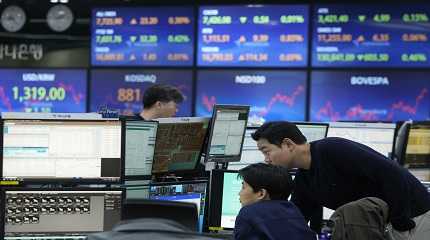
HONG KONG (AP) — World markets mostly advanced Friday after Wall Street recouped most of the week’s earlier losses and Japan reported slowing inflation, which may keep its ultra-low interest rates steady.
Futures for the Dow Jones Industrial Average edged 0.1% higher and the S&P 500 was up 0.2%.
France’s CAC 40 added 0.5% to 7,434.81 in early trading. Germany’s DAX went up 0.4% to 16,635.19. Britain’s FTSE 100 climbed 0.7% to 7,510.86.
U.K. retail sales experienced the sharpest decline since the COVID-19 lockdown three years ago, with a 3.2% drop in the volume of goods purchased in the nation in December, adding to a new risk of recession.
In the Asia market, Tokyo’s Nikkei 225 index climbed 1.4% to 35,963.27.
Japan’s inflation slowed for a second straight month, increasing the chance that the Bank of Japan will keep its ultra-low interest rates unchanged at its meeting next week. The country’s annual headline inflation rate has remained above the BOJ’s 2% target since April 2022, with a gradual decline observed from its peak of 4.3% last year to the rate of 2.6% in December that was reported Friday.
Hong Kong stocks were on track for their third consecutive week of losses as investors remain worried about the gloomy economic prospects. The Hang Seng in Hong Kong lost 0.5% to 15,368.69 and the Shanghai Composite index was down nearly 0.5% at 2,832.28.
In South Korea, the Kospi added 1.3% to 2,472.74. Australia’s S&P/ASX 200 advanced 1% to 7,421.20. In Bangkok, the SET was up 0.2%. Taiwan’s Taiex gained 2.6%, with Taiwan Semiconductor Manufacturing Co. adding 6.5%.
On Thursday, the S&P 500 rose 0.9% to 4,780.94 following back-to-back drops that started the holiday-shortened week. The Dow Jones Industrial Average gained 0.5% to 37,468.61, and the Nasdaq composite jumped 1.3% to 15,055.65.
The market was broadly steadier as Treasury yields in the bond market slowed their jump from earlier in the week. Yields had been climbing as traders pushed back their forecasts for how soon the Federal Reserve will begin cutting interest rates. Higher yields in turn undercut prices for stocks and raise the pressure on the economy.
The Fed has indicated it will likely cut rates several times in 2024 because inflation has been cooling since its peak two summers ago, meaning it may not need as tight a leash on the economy and financial system.
The yield on the 10-year Treasury rose again Friday, to 4.15% from 4.11% late Wednesday.
Treasury yields swung up and down in the minutes after a report on Thursday morning showed the number of U.S. workers applying for unemployment benefits fell last week to its lowest level since two Septembers ago. That’s good news for workers and for the economy overall, which has so far powered through predictions for a recession.
Other reports on the economy were mixed Thursday. One showed manufacturing in the mid-Atlantic region is contracting by more than economists expected. Another said homebuilders broke ground on more projects last month than economists expected, even if it was weaker than November’s level.
In energy trading, benchmark U.S. crude added 27 cents to $74.22 a barrel. Brent crude, the international standard, gained 21 cents to $79.31 a barrel.
The U.S. dollar inched up to 148.31 Japanese yen from 148.15 yen. The euro cost $1.0871, down from $1.0874.




